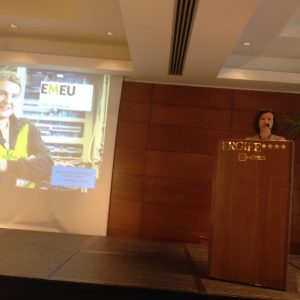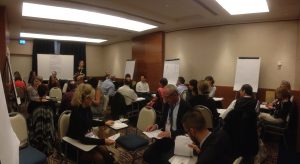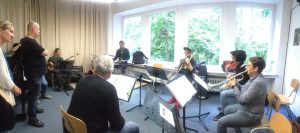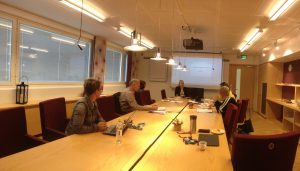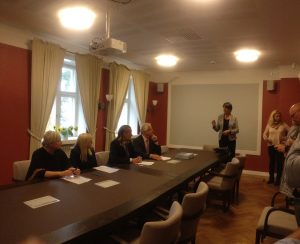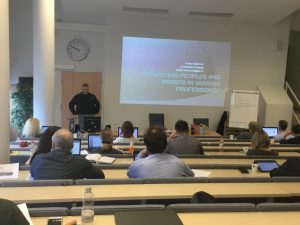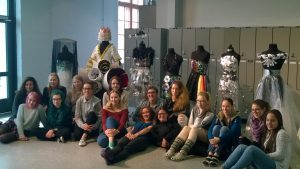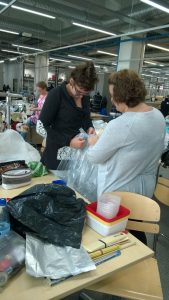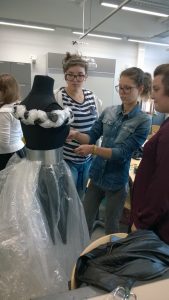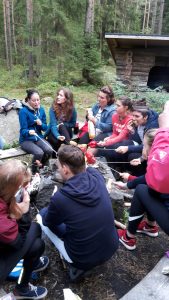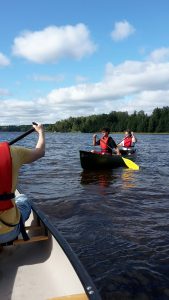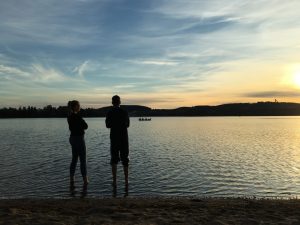
Who are you and where do you come from?
My name is Deike Wengatz, I am 22 years old and I am from Germany. My friends say that I am a honest, helpful and friendly person. I love reading a good book, hang out with friends and to travel.
My name is Julian Wolters. I’m twenty-four years old and from Germany, too. I am known as a faithful, attentive and nice person. I love cars, like the nature and enjoy to travel.
What are you studying?
We are both in our second year of a school for business administration with the subject tourism in Wittmund, Germany. We learn a lot about marketing, accounting and the management from companies, especially tourism companies like tourist informations, bus companies or hotels.
We made our internships in a hotel on the German island Juist (Deike) and in a bus company in the tourism area Bad Zwischenahn, Germany (Julian).
What have you been doing in Jyväskylä?
Our task was to collect experiences about the practical parts of tourism. We wanted to see the differences to the German summer tourism and see the other cultures and possibilities of the country.
We organized with Finish students a nature trail for studens from Italy, was kayaking and canoeing, doing outdoor activities like beach football, slackline, volleyball and tennis and learned how to guide a group in the kayaking and canoeing.
We also suggest a presentation about our German home and the waddensea for the students from your Finish class. Some of them will come to Germany in the December and it was nice to tell them something about our country and the cities they will visit.
How long have you stayed in Jyväskylä?
We were in Finland for four weeks. We arrived in Jyväskylä at the 15th of August and we will be leaving at the 12th of September.
We also stayed two days in Helsinki from the 25th – 26th of August.
Do you think the time has been too short (why?), too long (why?)
The time of four weeks was for us a perfect time to stay in Finland/Jyväskylä. It was not too long or too short. We think we have seen everything that we wanted to see and learned a lot. If the time was shorter it wouldn’t be so instructive. We used the whole time to see so many things of Jyväskylä and the Finish nature.
What have you learned during your stay?
We learned so much of the different cultures here. The people was so much nicer than in Germany. We also learned to speak a better English than before and some words in Finish.
It was fun and interesting for us to learn the canoeing and kayaking and how to fall in the water, swim with the canoe back to the beach and keep the water out of the canoe. The water was very cold!
In Germany we go rarely to the forests. So it was nice to go to a forest, plan a nature trail and learn a lot of the trees, berries and how to make a campfire.
What have been the best moments during your stay?
One of the best moments was definitely to see the northern lights! It was a cold and clear night and such a beautiful moment. Our short trip to Helsinki was also a highlight. In the time we stayed there was the “night of arts”. In the whole city of Helsinki was artists who played something on instruments or demonstrate their art. At the second day we were sightseeing in suomenlinna, an old seacastle a few kilometers in front of Helsinki. it’s a very nice place to see.
Our absolutely highlight of the trip was the people here. We have found many new friends and they made our stay unforgettable. They spent much time in the afternoons after school or in the evenings with us and was always helpful. We had a very good time with them!
Give three tops and tips (based on your own experience) to someone who is planning to come to Jyväskylä. How should they prepare? What should they do/see/visit/experience?
- Visit the tower of Jyväskylä. You will have a great view of Jyväskylä and the lakes around the city.
- Go to a forest, make campfire and grill some sausages.
- If you have the chance enjoy a finish sauna and go after it into a lake to cool down
- On a nice clearly evening in the right time you have to see the northern lights
Take sports clothes with you. Most of the people in Jyväskylä are sporty and active. When you walk around you will see people playing volleyball, beachfootball or playing other games.
More information about mobility in tourism education: Timo Lehtonen and Mira Ahtila (at)jao.fi
More information about outgoing and incoming mobility in general: Milka Niskanen (at)jao.fi

